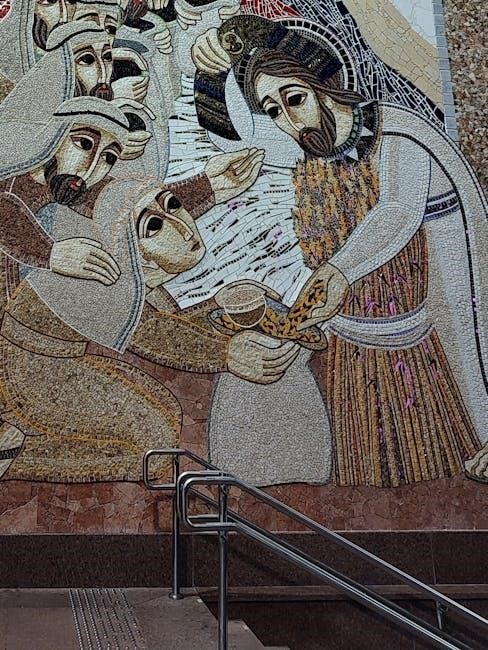The Acts of the Apostles, a New Testament book, bridges the Gospels and Epistles, detailing the early Christian church’s growth and missionary efforts. Available as a PDF download, it provides historical and theological insights into the spread of Christianity, highlighting the Holy Spirit’s role and the apostles’ ministries.
Historical Significance of the Acts of the Apostles
The Acts of the Apostles holds profound historical significance as it chronicles the birth and expansion of the early Christian church. It bridges the Gospels and the Epistles, providing a narrative of how Christianity spread from Jerusalem to the world. The book details pivotal events like Pentecost, the conversion of Saul, and the Jerusalem Council, which shaped the church’s identity. The Holy Spirit’s empowerment of believers is a recurring theme, illustrating divine guidance in the church’s growth. Scholars like Ellen G. White and N.T. Wright have contributed insights, while downloadable PDF resources offer accessible study materials. This text remains a vital historical and theological resource for understanding Christianity’s foundation and mission.
Overview of the Acts of the Apostles PDF
The Acts of the Apostles PDF offers a comprehensive digital version of the New Testament book, featuring all 28 chapters. It includes study aids like note-taking sections, making it ideal for educational and personal use. Available for download on various platforms, the PDF provides insights into the early church’s growth, missionary journeys, and key events. Works by scholars such as Ellen G. White and N.T. Wright are included, offering deeper theological understanding. The PDF format ensures accessibility, allowing readers to explore the historical and spiritual significance of Acts conveniently. It serves as a valuable resource for both scholars and laypersons seeking to study the text in depth.

Key Themes in the Acts of the Apostles
The Acts of the Apostles emphasizes the Holy Spirit’s empowerment, the early church’s unity and growth, and the apostles’ missionary efforts spreading Christianity globally.
The Ministry of the Holy Spirit
The Holy Spirit’s ministry in Acts begins with Pentecost, empowering believers to witness boldly. It transforms lives, enables spiritual gifts, and guides the church’s growth and decisions, as seen in key events like the ordination of leaders and the inclusion of Gentiles. The Spirit’s role is central, directing missionary journeys and ensuring the church remains faithful to God’s plan. This divine guidance is vital for understanding the early church’s expansion and unity, as documented in the Acts of the Apostles PDF, which highlights the Spirit’s ongoing work in the lives of believers and the church’s mission.
The Early Christian Church and Its Growth
The early Christian church experienced rapid growth, spreading from Jerusalem to the wider world. Unity among believers, shared practices like teaching, fellowship, and prayer, and the Holy Spirit’s empowerment were key factors. The church’s growth is documented in the Acts of the Apostles PDF, highlighting pivotal events such as Pentecost and the inclusion of Gentiles. This period laid the foundation for the church’s mission and structure, demonstrating how believers lived out their faith in community and obedience to God’s will, providing a model for modern Christian living and church growth.
The Role of Apostles in Spreading Christianity
The apostles played a pivotal role in spreading Christianity, as recorded in the Acts of the Apostles PDF. After the ascension of Jesus, they became the primary leaders and missionaries of the early church. Their preaching, empowered by the Holy Spirit, led to the conversion of thousands. Figures like Peter and Paul emerged as central figures, with Peter leading in Jerusalem and Paul undertaking missionary journeys to Gentiles. The apostles’ courage, obedience, and commitment to sharing the Gospel transformed the early church, establishing communities across the Mediterranean world and laying the foundation for global Christianity.

Major Events in the Acts of the Apostles
The Acts of the Apostles PDF highlights pivotal events like the Day of Pentecost, the conversion of Saul, and the Jerusalem Council, shaping the early church’s expansion and unity.
The Day of Pentecost and the Outpouring of the Holy Spirit
The Day of Pentecost, as recorded in Acts 2, marks a pivotal moment in Christian history. It was on this day that the Holy Spirit descended upon the disciples, empowering them to speak in diverse tongues and boldly proclaim the Gospel. This miraculous event, detailed in the Acts of the Apostles PDF, symbolized the fulfillment of Jesus’ promise to send the Holy Spirit as a Comforter and Advocate. The outpouring of the Spirit not only transformed the lives of the disciples but also sparked the rapid growth of the early church, uniting believers in faith and purpose. This event remains central to understanding the ministry of the Holy Spirit and the expansion of Christianity.
The Conversion of Saul (Paul the Apostle)
The conversion of Saul, later known as Paul, is a transformative event in the Acts of the Apostles. Once a fierce persecutor of Christians, Saul encountered the risen Jesus on the road to Damascus, leading to his dramatic conversion. This pivotal moment, detailed in Acts 9, marked the beginning of Paul’s mission to spread Christianity. His transformation from a Pharisee to a passionate apostle underscores God’s grace and redemption. The event is central to the narrative of the early church’s expansion, as Paul became a key figure in missionary work, spreading the Gospel to Gentiles and establishing churches across the Mediterranean.

The Jerusalem Council and Its Decisions
The Jerusalem Council, detailed in Acts 15, was a pivotal gathering of early church leaders to address whether Gentile converts needed to adhere to Jewish traditions like circumcision. Peter, James, and other apostles debated, concluding that Gentiles should only abstain from idolatrous practices, fornication, and consuming blood or strangled animals. This decision, validated by the Holy Spirit, unified Jewish and Gentile believers, fostering the church’s expansion. The council’s ruling, recorded in the Acts of the Apostles PDF, highlights the early church’s commitment to grace and inclusivity, enabling Christianity to spread beyond its Jewish roots to a broader, diverse audience.

Key Figures in the Acts of the Apostles
Peter, Paul, Stephen, Philip, and James are central figures, each playing unique roles in the early church’s growth and missionary efforts, as detailed in the Acts of the Apostles PDF.
Peter and His Leadership in the Early Church
Peter emerged as a prominent leader in the early Christian church, demonstrating boldness and faith. He preached powerfully on the Day of Pentecost, leading thousands to conversion. Peter’s leadership extended to healing the lame man at the temple and addressing the Jerusalem Council, where he advocated for Gentile inclusion. His actions, guided by the Holy Spirit, set foundational precedents for the church’s growth and unity. The Acts of the Apostles PDF highlights Peter’s transformative role, showcasing his transition from a disciple to a pivotal leader in spreading Christianity. His legacy remains central to the church’s identity and mission.

Paul the Apostle and His Missionary Journeys
Paul, once a persecutor of Christians, became a pivotal missionary after his dramatic conversion on the Damascus road. The Acts of the Apostles PDF details his three major missionary journeys, during which he preached to both Jews and Gentiles, establishing churches across Asia Minor, Greece, and Rome. Paul’s letters, inspired by his experiences, are foundational to Christian theology. His journeys, marked by hardships and divine interventions, demonstrate his unwavering commitment to spreading the Gospel. Paul’s missionary work, as recorded in Acts, laid the groundwork for the global spread of Christianity, making him one of the most influential figures in church history.

Structure and Content of the Acts of the Apostles PDF
The Acts of the Apostles PDF is structured into 28 chapters, chronicling the early church’s growth, missionary journeys, and key events like Pentecost and Paul’s conversions. It provides theological insights, historical context, and practical lessons for modern Christian living, serving as a comprehensive guide to understanding the spread of Christianity.
Chapters and Verse Breakdown
The Acts of the Apostles PDF is divided into 28 chapters, each detailing pivotal events in the early Christian church. Chapters 1-5 focus on the apostles’ ministries in Jerusalem, including Pentecost and the establishment of the church. Chapters 6-12 highlight Stephen’s martyrdom, the persecution of believers, and the church’s expansion beyond Jerusalem. Chapters 13-21 recount Paul’s missionary journeys, his conversions, and the spread of Christianity among Gentiles. Chapters 22-28 detail Paul’s arrest, trials, and eventual journey to Rome. The PDF format includes verse-by-verse breakdowns, enabling readers to study the text systematically and gain insights into the historical and theological foundations of Christianity.
Historical and Theological Insights
The Acts of the Apostles PDF provides deep historical and theological insights into the early Christian church. It highlights the transition from a Jewish-focused ministry to one that embraces Gentiles, reflecting God’s plan for universal salvation. The book emphasizes the Holy Spirit’s empowering role, evident in events like Pentecost and the conversion of Paul. Theologically, it underscores themes of faith, perseverance, and divine providence. Historically, it bridges the gap between Jesus’ ministry and the spread of Christianity, offering context for understanding the New Testament epistles. The PDF format enhances study by allowing readers to explore these insights systematically and reflect on their relevance for modern faith.

Modern Relevance and Application
The Acts of the Apostles PDF remains vital for contemporary Christian living, offering lessons on faith, community, and missionary work, guiding believers in spiritual growth and service today.
Lessons for Contemporary Christian Living

The Acts of the Apostles PDF offers timeless lessons for modern Christians, emphasizing the importance of fellowship, prayer, and unity. The early church’s commitment to shared life and mission serves as a model for today’s believers. The empowerment of the Holy Spirit, evident in the apostles’ bold witness, encourages Christians to live with purpose and courage. The book also highlights the transformative power of faith, demonstrating how ordinary people can impact the world through obedience to God. These principles inspire believers to prioritize spiritual growth, community, and missionary work, ensuring the church remains a vibrant, Spirit-led force in the modern world.
The Acts of the Apostles as a Guide for Missionary Work
The Acts of the Apostles serves as a powerful guide for missionary work, detailing the expansion of Christianity from Jerusalem to the world. It highlights the apostles’ reliance on the Holy Spirit for empowerment and direction. The missionary journeys of Paul and others demonstrate strategic outreach, cultural adaptation, and perseverance amid challenges. The book emphasizes the importance of preaching, discipleship, and establishing local churches. It also shows how missionaries navigated diverse contexts, from Jewish communities to Gentile audiences. These principles provide a timeless blueprint for modern missionaries, inspiring bold evangelism, faith-driven action, and a commitment to spreading the gospel universally.
The Acts of the Apostles is a foundational text, bridging the Gospels and Epistles, and offering insights into the early church’s growth and missionary endeavors. Its timeless lessons continue to inspire modern Christian living and missionary work, emphasizing the Holy Spirit’s empowerment and the importance of spreading the gospel universally.
The Acts of the Apostles is a pivotal New Testament book chronicling the early Christian church’s expansion and missionary endeavors. It highlights the Holy Spirit’s empowering role, the apostles’ leadership, and key events like Pentecost and Paul’s conversion. The book bridges the Gospels and Epistles, providing historical context for the spread of Christianity. Available as a PDF download, it includes 28 chapters from the New Jerusalem Bible, with notes for study. Acts emphasizes unity, faith, and the universal mission of spreading the gospel, offering timeless lessons for modern Christian living and discipleship. Its insights remain vital for understanding the church’s growth and spiritual foundation.
Final Thoughts on the Importance of the Acts of the Apostles
The Acts of the Apostles is a cornerstone of Christian history, bridging the Gospels and Epistles while chronicling the church’s rapid growth. It highlights the Holy Spirit’s transformative power, the apostles’ courageous leadership, and the universal mission of spreading the gospel. The book’s accounts of Pentecost, Paul’s conversion, and the Jerusalem Council provide deep theological and historical insights. As a PDF download, it remains accessible for study, offering lessons on unity, faith, and mission. Acts not only roots modern Christianity in its spiritual heritage but also inspires believers today to embrace their role in advancing God’s kingdom, making it a timeless and indispensable text.